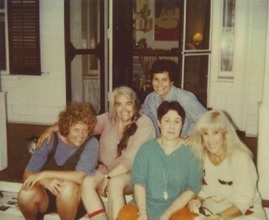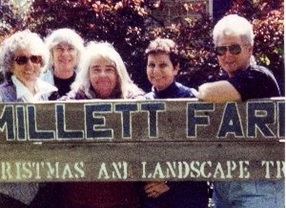KATE MILLETT & ME: A MEMOIR OF FRIENDSHIP
By Eleanor Pam
She had long black hair that contrasted dramatically with milk- white skin and she talked in a soft, slightly husky voice. She spoke as if there were a cigarette dangling from her mouth, even when there wasn't. It made her sound slightly tough. Her name was Kate Millett and she lived on the Bowery. That alone was both shocking and intriguing. It was the late fifties and no one lived in such a dangerous and disagreeable area, especially a single female! Never had I encountered an educated woman from the middle class who was not only determined to embrace downward mobility, but who delighted in it. Creating a home in the most déclassé neighborhood in the city was a statement she was making then and for the rest of her life. She never left.
|
|
|
“Kate Millett at the Los Angeles Women’s Center, 1977” photographed by Michiko Matsumoto, from the Kate Millett Papers. © Michiko Matsumoto |
I think it was my newly minted degree in Philosophy that attracted Kate the most when we first met. In turn, I was awed by her obvious brilliance. She was also quirky and extreme, an original. These qualities initially drew me to her and simultaneously made me anxious. An odd duck to be sure, but interesting and disquieting at the same time. We shared many common and uncommon interests but our differences were just as apparent. Kate was unlike anyone I had ever known, including me. It wasn't only that we came from completely different worlds; the woman seemed to inhabit a universe of her own, one that was not always intelligible or accessible to me. I could rarely decide if she was the alien, or I was. We both lived in our heads, but I was better at pretending that I didn't.
During that period, I was earning a salary of $4,000 a year as a teacher, a sum that seemed like a small fortune to us both. I knew Kate had very little money and was seriously estranged from the aunt who had subsidized her education at Oxford. If she had other income streams they were not obvious. While her impecuniousness was not an expressed concern, it was an undeniable reality. Her mind seemed focused instead on a love relationship that was apparently not going well. It was that, not money, which both preoccupied and obsessed her. Later that would change, when the prospect of poverty would stalk and terrify her like a bogyman she could never dodge.
Her pallor so alarmed me that I mistook it for sickliness, not the love-sickness it probably was. Compelled to do something to aid her recovery, I would periodically present myself at her door and filled with the determination
and self-importance of a rescuer, kidnap her. I'd drive us to the beach in my flashy red convertible for fresh air and sun, then end the day with a triumphantly sybaritic excursion to Chinatown for a decent meal.
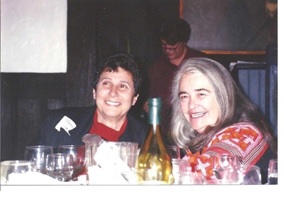 The thing that impressed Kate most about those outings was not what I expected. Like a child who does not focus on the toy, but the box it comes in, Kate did not gush about the food, the beach, our conversation or my stellar company. Instead, she was wowed by my ability to reach our destination in one straight and unfettered shot, to time and calibrate the car's pace so we'd catch every green light and keep on zooming. For whatever reason, this minor talent delighted her. Anarchist that she was, perhaps she was simply appreciating the elegance of beating the system without breaking the law. Later, Kate observed that it was a metaphor for the way I lived my life. Eventually she wrote about this in her third book, FLYING, but the section ended up on the cutting room floor.
The thing that impressed Kate most about those outings was not what I expected. Like a child who does not focus on the toy, but the box it comes in, Kate did not gush about the food, the beach, our conversation or my stellar company. Instead, she was wowed by my ability to reach our destination in one straight and unfettered shot, to time and calibrate the car's pace so we'd catch every green light and keep on zooming. For whatever reason, this minor talent delighted her. Anarchist that she was, perhaps she was simply appreciating the elegance of beating the system without breaking the law. Later, Kate observed that it was a metaphor for the way I lived my life. Eventually she wrote about this in her third book, FLYING, but the section ended up on the cutting room floor.
Obviously, her editors were less enthralled by my parlor trick than she was.
In the winters, the only source of heat in Kate's apartment was a coal-burning, pot-bellied stove that sat precariously on the badly rotted wood floors of her dilapidated flat. A cast-iron creature so heavy I would not have been surprised if one day it crashed through to the flat below. Because it was a hassle to keep running up and down the steep steps to feed the fire, she asked her friends to help out. So we'd scoop up handfuls of coal from a filthy sack that nestled at the bottom of her stairs, then carry ourselves--and the coal--upstairs. A delighted Kate, watching the scene from above, would call down greetings, cheerily monitoring our progress as each of us, with blackened fingers and coal-speckled clothes, panted to the top.
The apartment, like the woman herself, was a miracle of surprise. It was a large space filled with books and more books, wall to wall, floor to ceiling. They compensated for sparse furnishings and a lack of amenities, including a bathroom without a door, as well as for the sour smells that permeated the walls from outside. Winos and derelicts lay strewn with their empty liquor bottles across her broken front steps, causing me to worry each time I visited this young woman who was my friend, living alone in this neighborhood and under these conditions.
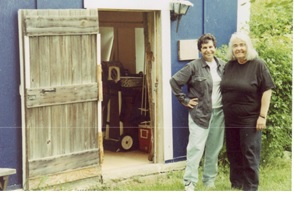 We had great fun exploring the city and sampling its banquet of adventures and ideas, open to life as only the very young and innocent are capable. She took me to the Cedar Bar, a neighborhood pub where artists hung out, where she hung out. I didn't realize it then, but we were rubbing elbows with Willem de Kooning, Jackson Pollock, Larry Rivers. How could I know who they were and who they would become?
We had great fun exploring the city and sampling its banquet of adventures and ideas, open to life as only the very young and innocent are capable. She took me to the Cedar Bar, a neighborhood pub where artists hung out, where she hung out. I didn't realize it then, but we were rubbing elbows with Willem de Kooning, Jackson Pollock, Larry Rivers. How could I know who they were and who they would become?
How did I know who Kate Millett was and who she would become?
In 1961, Kate declared she was going off to Japan to study art. This struck me as a bad idea, even worse than her decision to live on the Bowery. She knew no one there, did not speak Japanese, and it was halfway around the world. Two years later, she returned with a boyfriend and fellow sculptor named Fumio Yashimura, an urn containing his dead wife's ashes--and a friend, Yoko Ono.
After their marriage in 1965 I paid them a visit. They were living at Kate's apartment on the Bowery. But as I approached the front door, my eyes were routinely drawn to the familiar sign over her doorbell: Kate Millett. But wasn't she now Kate Yashimura? I thought. And there was Fumio's name, in neat lettering, taped beneath her own. The sight was so beyond my experience I had trouble processing it. Married women always took their husband's names! Didn't he object?
They were cute together. Fumio was a diminutive man--slight, almost girlish in build. He had a kind face, gentle manner and spoke very little English. At first, Kate served as his translator. She told him she regretted he could not understand the nuanced bite of my wisecracks, a street affectation I had at the time that seemed to endear me to her. But despite the language handicap and the imprecision of relying on Kate as our interlocutor, he and I seemed to communicate well, and I liked him. A gifted artist, Fumio built delicate mobiles of birds that hung trembling from the ceiling of Kate's apartment. They complemented her pop art that was on display everywhere in the flat, like witty furniture.
She told me they married to solve Fumio's immigration problem, making it sound like a business decision rather than a romantic one. But although she sounded almost apologetic, perhaps even defensive, it was clear that the relationship was a genuine one. When they were together they created an atmosphere of calm compatibility. I was happy for Kate. Gone was the low grade fever of sadness and sorrow, the whiff of loneliness, some undefined suffering in her that seemed always to linger just beneath the surface--all appeared to have abated. Or so it seemed.
They divorced in 1985, the marriage technically lasting 20 years, although they lived apart for much of that time in an open relationship. After Fumio died in 2002, Kate told me she was planning to write a book about him. But she already had, I thought. She described her marriage and its disintegration in FLYING, as well as the female love interest who'd supplanted Fumio and impelled Kate's return to her previous lifestyle as a woman who loved women.
She continued to drag me to meetings and protests all over the city, championing causes that reflected themes of social unrest and social justice: civil rights, anti-Vietnam War, and pacifism--including many fringe groups too bizarre even for my unformed tastes.
Finally, she took me to a meeting that resonated in a way the others had not. We sat in a room with passionate and argumentative women who had recently formed an organization called NOW. They were magnificent, I thought, thrilled to my core.
I joined immediately and, with Kate looking over my shoulder, perused a menu of possible committees. It was no surprise that I selected Education, Kate's own specialty. She was the Chair and I, Vice-Chair. There were no other members. A committee of two, we elected each other.
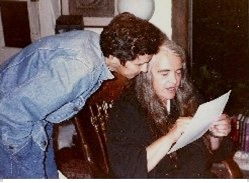 Together, we tackled the daunting job of analyzing curricula and pedagogical trends across the country. It was mind-blowing to discover how pervasive and systematic was the bias against females and the ways in which it infected our entire system, short- circuiting girls and women from getting good educations and eventually, productive jobs and careers as well.
Together, we tackled the daunting job of analyzing curricula and pedagogical trends across the country. It was mind-blowing to discover how pervasive and systematic was the bias against females and the ways in which it infected our entire system, short- circuiting girls and women from getting good educations and eventually, productive jobs and careers as well.
Where were our judges, college presidents, and architects? They were in the next generation, soon to be born, we hoped.
Kate and I took turns presenting our recommendations and findings in a final report that we read at a meeting, a version of which was published by NOW in 1968 under her name as TOKEN LEARNING.
Kate's hand and voice shook as she read her portion of our “poop sheet” to the group, and I remember how the paper she held also trembled, betraying her fright. The terror that seized her at that meeting would never really abate, even after she became a practiced speaker and stood at multiple microphones addressing hundreds,
maybe even thousands of people. She was so very shy and scared. Large group or small--it didn't matter. Kate forced herself to perform, but it was never easy or natural.
We couldn't have known it then, but our work later became the foundation for many studies and a raised national, even global consciousness, resulting in dramatic and gratifying changes to gender-based educational practices in this country and others.
 Kate pursued her doctoral studies at Columbia University and was graduated with distinction. But she also delivered a dissertation so brilliant and original it caused a sensation. Published in 1970 as SEXUAL POLITICS, it would become a classic and the bible of the women's Movement. These very writings also created a firestorm. This yin and yang of both cheers and jeers was the very spine of her life, inapposite doppelgangers that often derailed her. She was Janus, writ large.
Kate pursued her doctoral studies at Columbia University and was graduated with distinction. But she also delivered a dissertation so brilliant and original it caused a sensation. Published in 1970 as SEXUAL POLITICS, it would become a classic and the bible of the women's Movement. These very writings also created a firestorm. This yin and yang of both cheers and jeers was the very spine of her life, inapposite doppelgangers that often derailed her. She was Janus, writ large.
Doubleday hosted a publication party which Kate insisted be held at CBGB's, a dingy neighborhood bar several doors down from her apartment, later to become famous as an underground rock music dive. Kate took pride in being a “downtown artist,” another example of her reverse elitism. So CBGB's it had to be! At the time, however, its allure was not obvious as it shared the ripe smells of the Bowery along with a clientele that was mainly indigent, alcoholic and homeless.
Bums mingled with the invited guests at this event, many of the latter attired in outrageous clothing that offended the aesthetic eye of the photographer sent to document the occasion. Flopping down on the bench next to me, he rested his camera on the table and complained that there was not one useable or respectable picture that he could send back to his boss at Doubleday for publicity purposes. The scene was way out, he lamented: crazy people running around in feathers and beads wearing mismatched outfits and costumes, many of them not distinguishable from the street people coming in and out of the bar.
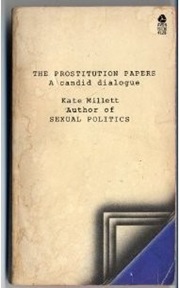 Kate's next literary effort, THE PROSTITUTION PAPERS, precipitated a personal crisis. She was having problems with the IRS and needed my help. Why me? Because I was her friend, obviously; but also because she saw me as grounded, in the world, of the world, a person who knew her way around bureaucracies, someone with connections and contacts. The government was after her, Kate declared, demanding their cut of monies she had earned from SEXUAL POLITICS. But she had no money; she had given it all away to sex workers. Kate was a luftmensch and an innocent: Taxes on royalties? It never occurred to her to worry about such things until the garbage landed on her head. Of course, I came running.
Kate's next literary effort, THE PROSTITUTION PAPERS, precipitated a personal crisis. She was having problems with the IRS and needed my help. Why me? Because I was her friend, obviously; but also because she saw me as grounded, in the world, of the world, a person who knew her way around bureaucracies, someone with connections and contacts. The government was after her, Kate declared, demanding their cut of monies she had earned from SEXUAL POLITICS. But she had no money; she had given it all away to sex workers. Kate was a luftmensch and an innocent: Taxes on royalties? It never occurred to her to worry about such things until the garbage landed on her head. Of course, I came running.
New groups were forming, splintering off from NOW. Kate seemed to be everywhere, prominent in her role as an articulate voice of the Movement. In fact, she stated, if there were a thousand feminist organizations, she would join them all. I believed her. Kate's passion for this new cause burned bright, different from the flameouts of her personal relationships that so often brought her grief and brought her down. For her, romantic love was a bad drug, an opportunistic infection that took hold of her soul. She just wasn't good at it.
But she was good at feminism. Psychically, she now seemed turbo-charged, and privately I cheered. Against all odds and all bets, mine included, she had become an accidental celebrity.
My friend, who had many gifts but seemingly few prospects, morphed into one of the most famous people in the world--her face on Time Magazine, “the Mao Tse-Tung of Women's Liberation,” they wrote. On August 26, 1970, she marched down Fifth Avenue at the head of an army of women. I watched with pride as she ascended the podium at Bryant Park, took the microphone, and exhorted the crowd. She was a midwife of the Movement and in helping to birth it, was herself reborn.
The New York Times anointed her “the principal theoretician of the women's movement.” Kate's acclaim lasted awhile and then cratered into scandal and assault. She, who had been feted and admired, was now demonized and discredited. The cruelty was extraordinary. Her flaws were magnified; her virtues and accomplishments diminished or canceled. It turned out that she was all too human, after all. As Kate fell from grace, transitioning from famous to infamous, there were many defections. Friends and fans turned on her; feminists did, too, although certainly not all. Ultimately, Barbara Love and others organized a press conference. There was enthusiastic support from feminist leaders, including Gloria Steinem.
But it broke my heart to watch it all unfold. It also broke hers.
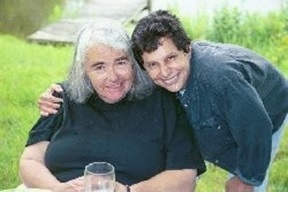 What were her crimes? First, she wrote a book so important and controversial that it rocked the world. Then, she came out nationally (or was outed) as a bisexual woman. This caused a furor on both sides of the sexual spectrum. Lesbian purists, as well as self-righteous heterosexuals, were offended by Kate's reluctant disclosure--the former because she did not go far enough, and the latter because she went too far. In all events, both sides judged her harshly. Amplifying the noise was the wrath of Norman Mailer wielding his avenging pen. Aimed more at her sex than her sexuality, he emitted the male roar in one long screed and tantrum called, THE PRISONER OF SEX. The party, it seemed, was over.
What were her crimes? First, she wrote a book so important and controversial that it rocked the world. Then, she came out nationally (or was outed) as a bisexual woman. This caused a furor on both sides of the sexual spectrum. Lesbian purists, as well as self-righteous heterosexuals, were offended by Kate's reluctant disclosure--the former because she did not go far enough, and the latter because she went too far. In all events, both sides judged her harshly. Amplifying the noise was the wrath of Norman Mailer wielding his avenging pen. Aimed more at her sex than her sexuality, he emitted the male roar in one long screed and tantrum called, THE PRISONER OF SEX. The party, it seemed, was over.
I didn’t have imagination enough to envision any of it. Nor did I foresee the cost to her--how expectations and pressures colluded to stain and poison her life and sometimes make her ill. Kate's sudden, unexpected celebrity had changed me, too, at least for a little while. I had become self-conscious and shy in her presence, aware also that we could not go out in public without people gawking or interrupting us to chat. Everyone seemed to know her. Eventually though, my awkwardness about her new status passed.
One evening, we were at the theatre watching a play whose female star was Arthur Miller's sister. Sure enough, at intermission I spotted him standing in the back with his daughter Rebecca. “Look, look,” I said excitedly. “There's Arthur Miller! Do you want to go over and say hello?” This was a writer whose work I'd always admired, and I was eager to meet him. Kate shrugged. “Sure,” she said casually and without revealing anything more. “Okay, let's do it,” I said happily, and charged over to them. Kate lagged shyly behind me, but I felt shielded by her fame.
“Mr. Miller,” I announced triumphantly and presented her with a flourish as if I was a chef in a pricey French restaurant offering up the best dish on the menu. “I've got Kate Millett here with me.” I pointed to her. But she wasn't next to me or immediately within sight. I turned around to look, taking my raised finger with me. While she wasn't exactly hiding behind me, it would have been a pretty fair description to say she was. Kate managed a small smile, and I shoved her in his direction. “We just wanted to say hello,” said I brightly, hoping to penetrate the density of his blank stare. “Kate Millett!” I insisted, plunging ahead. “You know--the feminist!” His expression remained impassive. I gave him a clue. “She wrote SEXUAL POLITICS,” I prompted. No reaction. The blood rushed to my face.
His daughter, Rebecca Miller--bless her--saved me. (She was later to become a writer herself and marry Daniel Day Lewis, the actor.) Rebecca was jumping up and down with excitement. “Dad!” she cried. “Kate Millett!! You know! She helped found the women's Movement. You must have heard of her!” Rebecca kept looking at Kate and then at her father. Her eyes, dancing with pleasure and respect, finally settled on Kate while Miller only shook his head--stolid, unmoved, and unimpressed. Kate was already retreating from our little group while I was wishing that I'd done something simpler during intermission, like go to the bathroom or buy a soda. Finally, he gave us back our freedom. “How do you do,” Arthur Miller said at last, with formal dignity. He was so stiff I thought he'd never be able to get back into his seat.
After we made our escape, Kate finally spoke. “He never remembers me,” she said with disgust. I looked at her. Now I was really scratching my head. “So you've met him before?” I ventured. “Yes,” she said, and made no further comment on the subject. We watched the rest of the play in silence.
Kate did so many improbable things. She bought a farm, raising and selling Christmas trees, and then turned it into an Art Colony. At first I scoffed. “You're becoming a farmer? Are you kidding?” But she wasn't, and to make her point, marched in the Gay Pride Parade with a contingent of women rounded up for the occasion and underneath a banner that read, “Farm Dykes.”
Many distinguished feminists made the trek to The Farm, and in some respects it became an important historical marker, perhaps even a feminist institution. Simone de Beauvoir visited one year. When she died, Kate represented the United States at her funeral in France. She happened to be in Paris at the time of the great woman's death and asked de Beauvoir's sister, Helene, if she could sit with the body for a few minutes. Stunned, she stayed for fifteen minutes, after which she remarked that de Beauvoir's profile looked like what you would see on a Roman coin. Kate was invited to march behind the sister and Claude Lanzmann, de Beauvoir's intimate friend who created the nine-hour documentary Shoah. Silvie, the companion and adopted heir, marched at the head of the line. The only other American was Ti-Grace Atkinson in the back of a long throng of mourners.
|
|
|
pictured: Linda Clarke, Kate Millett, Eleanor Pam, Phyllis Chesler, Merle Hoffman |
Often I have been humbled by Kate's ability to imagine possibilities I could not. When I look back at our years together, I see many instances when she led the way and I lagged one beat behind.
One day I was in my car listening to the radio when the newscaster broke into the program. “Famous writer and feminist, Kate Millett was just arrested in Iran by the Ayatollah Khomeini.”
My heart raced. This was serious! They could kill her, I remember thinking. Stone or behead her even. It was beyond scary. I remembered how excited Kate was about the trip and how much she was looking forward to meeting some of the Iranian feminists who had invited her to come. Suddenly, she found herself right in the middle of a revolution and, ultimately, in the clutches of religious fanatics! They hated her--this American feminist infidel who had come to spread her poisons. The Shah had been deposed and now they were cleaning house. Kate's timing could not have been worse. Events had moved too swiftly, overtaken her, and now she was trapped in this danger.
The State Department must have sprinkled its magic dust because she was thankfully released and expelled from the country. But I couldn't breathe properly until she was back again, safe on American soil.
Kate wrote eleven published books, scissoring her life into compartments in order to make art. She never understood the new cottage industry of Women's Studies that seemed to exclude or ignore her. I remember discussing this many decades ago over lunch with Kate and Robin Morgan, both of whom lamented that primary sources were in disuse, including their own books. None of the titles listed on the recommended reading lists were recognizable to either of them. Where in these courses were the feminist classics of the Second Wave? When had they been erased?
Women's Studies were a natural marketplace for Kate, but gradually all her books went out of print, including SEXUAL POLITICS. She framed the problem succinctly and unemotionally. It wasn't only that the books were out of print. She was out of fashion.
|
|
|
pictured: Blanche Wiesen Cook, Clare Coss, KATE; Eleanor Pam, Barbara Schork |
They arrived in caravans of cars and vans. The women who came were wonderful. They followed my instructions, which were actually obnoxious when I later thought about it. Everyone mingled and bought, bought and mingled. Kate was ecstatic. I was relieved. Kate seemed as moved by my support as she was happy about the money. I believe she was also turned on by the boldness of the idea and the audacity of my behavior. I knew that Kate--despite her doctorate, eleven published books and global celebrity--really enjoyed having customers.
In some ways she was an old fashioned shopkeeper, opening “lemonade stands” as she called it, in order to make a couple of bucks here and there. She's still doing it.
For years, she has suffered the stigma and shame of being labeled and defined by others as manic- depressive. She thinks and cares about mental illness and is a passionate participant in the anti-psychiatric movement. She's not too crazy about the pharmaceutical industry either, as suppliers of drugs that medicate patients and who are, therefore, in her view, complicit in their situation or captivity. Viscerally opposed to “anything that threatens liberty of person,” she is repelled by involuntary confinements of any kind and has found a home for her views at the United Nations where she spoke out in 2006 against “psychiatric torture.”
Almost twenty years earlier, in 1990, Kate wrote a breathtaking and painfully personal book, THE LOONEY BIN TRIP, which describes her experiences of being diagnosed as bipolar by mental health professionals and being held against her will in psychiatric facilities. A masterpiece, it displays Kate's graceful, brave and evocative writing at its most mature.
In spring 1991, I reviewed it in On the Issues, describing the book as a “psychological thriller of sorts…an unflinching examination of an evolving life and psyche...the story of an extraordinary woman in ugly circumstances, struggling against her many personal demons.”
State psychiatry is Kate's enemy; being institutionalized is her greatest fear. Too many misguided friends and relatives, she told me, have put her away over the course of her adult lifetime, situations where she has been at the mercy of substituted judgment. She needed my promise never to do that to her. I sighed, not with indecision but with sadness, and gave my word. It was a heavy conversation.
After years of trying--and failing--to achieve an academic career, we sat at dinner one night and talked about Kate's failure to land a steady and substantive job. Decades earlier she had been fired as an instructor at Barnard because of her sexuality and perhaps--to a lesser extent--her behavior during the student takeover of the Columbia University campus. This was a lost post she would forever mourn--an early and fatal turning point in her professional life, she believed. At dinner, Kate told me that she was confused by her inability to find sustainable work at a university, “a real faculty appointment.” Wasn't she qualified, credentialed enough? It hurt to think of herself as unemployable and left her with a sense of defeat. Worse, she confessed to being envious of a mutual friend who had arisen to dizzying heights in that world, a woman she had sometimes come to view as a rival. Kate looked down at her meal in misery, and I knew she was thinking about our friend, the person who had succeeded where she had not. It was clear that I needed to do something to lighten her mood so I comforted her with a flat truth. “Yes,” I said. “But you will be in the history books and she won't.” She rewarded me with a reluctant smile, but it was enough. The words had worked.
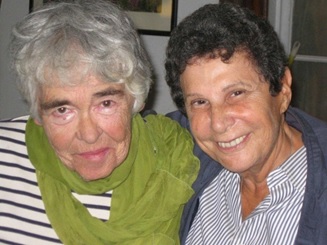 We have been “hanging out” for 54 years, having marvelous conversations and being amused by each other. Over the years, she has supported my prison work as an advocate for women who I believe to be unjustly incarcerated, lending her voice and presence on behalf of female inmates whenever I asked for her help, as well as the tattered but still intact prestige of her name. Her own work--whether political, literary or through graphic arts--consistently reflects the enormous empathy and compassion she feels for incarcerated and institutionalized persons. I am proud of her for that.
We have been “hanging out” for 54 years, having marvelous conversations and being amused by each other. Over the years, she has supported my prison work as an advocate for women who I believe to be unjustly incarcerated, lending her voice and presence on behalf of female inmates whenever I asked for her help, as well as the tattered but still intact prestige of her name. Her own work--whether political, literary or through graphic arts--consistently reflects the enormous empathy and compassion she feels for incarcerated and institutionalized persons. I am proud of her for that.
When she was celebrated as an icon and historical figure by the Veteran Feminists of America in November 1998 at the Armory in New York City, I had the privilege of helping to organize the event and speak about my old friend.
Kate Millett is still very much in the game. In the last two years she has been lavished with tributes and awards. It's been hard to keep up with them all.
Kate's prestigious alma mater, Oxford University honored her on May 2011. Yoko Ono's Foundation presented Kate with it Courage Award, Spring 2011. Kate glowed for months in their wake. The former brought validation for her brilliance and scholarship; the latter was a confirmation of character, friendship and heart.
On May 2012, I was invited to introduce Kate at the Lamda Literary Award ceremony in New York City where I was also to present her with a "Lammy," given in recognition of her work as a Literary Pioneer. Kate was noticeably frail at the time and it was difficult for her to stand or walk. She decided to skip the photographic sessions and all the red carpet hoopla, preferring to sit quietly beside me in her front row seat. The photographers sought her out there as did a number of admirers, including actress Ally Sheedy, who was with her daughter. Kate promptly invited both of them to the Farm. Sheedy responded by enveloping Kate--whom she had never met before--in a warm and emotional embrace which, in an excess of enthusiasm, was also bestowed upon me.
I barely had time to enjoy this unexpected and completely unmerited expression of affection when suddenly we were on! Show time! The MC introduced me and I flew up the steps, pausing to place a chair near the podium for Kate to sit on while I delivered my remarks and presented her with an impressive trophy. At a prearranged signal, friends helped Kate out of her seat and up the stairs to the stage. I began my introductory remarks and picked up the award, intending to turn it over to Kate with a dramatic flourish. It weighed a ton! I could barely hold on to the thing! How would Kate manage? But I needn't have worried. Kate charged ahead, accepting the trophy with apparent ease and dismissively waving away the chair I had provided. She shuffled to the podium and adjusted the microphone. The audience was in a reverential fever--standing, stomping their feet, clapping wildly. As I expected, Kate was shy. She spoke softly, haltingly, describing herself as "just a farmer." She urged the entire audience to come to the Farm. "This," she said, "is my gift to you."
"Thank you, Kate!" they chorused back, and gave her another long and noisy ovation. Later, I asked her how she felt when she saw them on their feet--not just once, but twice! She said, "Did they stand? I didn't notice. I was too scared."
|
|
|
Eleanor Pam, young feminists and (holding candles) |
On June 24, 2012 the Veteran Feminists of America paid tribute to Kate in an all-day event titled, The Kate Millett Festival. It brought together 200 feminist pioneers, most of whom were foundational in forming the modern women's movement. My contribution was as MC, producer and co-chair of the event. It was a long, long day--with many important speakers, videos, presentations and musical performances. I had earlier asked each scheduled speaker to limit themselves to three minutes but almost every one violated that request. There was simply too much for each to say about Kate, her contributions to feminism, and their personal connections to her. After awhile, I began to see a common thread, an organic happening. People wanted to be on the record about what they knew and felt about Kate, to document their part in her story.
I noticed that we also seemed to be of the same mind about something else--a clear but bittersweet sense that this was an historic occasion, an opportunity that might not come again. It was unspoken, but many of us wondered if ever we would all be together in the same room.
As the day lengthened I worried that we could lose the audience. The program did indeed seem very long as speaker after speaker went well beyond their allotted time. I fretted that I would eventually see glazed eyes and people falling into a coma. So I tried to speed things along--speaking more quickly, paring down the introductions, increasing the pace of events. But Kate, who was sitting in a chair on stage and hugely enjoying every minute, was having none of it. She saw what I was doing and kept whispering in admonition, "Slow down, slow down." What to do? This is Kate's event, I finally concluded, and she is my first priority. The audience will have to fend for themselves.
I have no regrets about that decision. Every time I looked her way I was rewarded by what I observed on her face--a constant smile, happy and shining eyes.
A month later, at home with Sophie, Kate watched the video of the Festival--every single moment of it. Transfixed and charmed, she cheered and laughed and clapped and wept all over again.
VFA recently created a special award in Kate's name, to be periodically presented to outstanding feminists who have made "extraordinary contributions to feminism." This was the first time that VFA singled out one of its own for this level of tribute. I was thrilled and honored to be further linked to my friend, Kate--both symbolically and historically--by receiving the First Kate Millett Award, presented to me by Gloria Steinem on October 29, 2011.
On February 2013, the University of Minnesota, Kate's undergraduate alma mater, voted to confer upon her an Honorary Doctoral degree in Science. Kate is especially tickled that the degree is in Science, definitely not one of her specialties.
Right on the heels of that good news, came the announcement that Kate Millett will be inducted into the National Women's Hall of Fame in Seneca Fall, October 2013. Many of us wonder what took them so long! But Kate said simply, "It's a great honor--overwhelming and very humbling."
At this writing, Kate's life is both evolving and complete. She has joined a gym and taken up boxing. She is cycling and treading and lifting weights!
When we celebrated Kate's birthday several years ago in October 2010 at the Farm in Poughkeepsie, New York, I remember looking at her--a then 76 year-old icon who was still enjoying making trouble. It was impossible not to smile and do a little time-tripping.
I was reminded of the young Kate and her short career as a kindergarten teacher, a job inspired by the example of my own steady paycheck and one I strongly encouraged her to take. She cheerfully became a kindergarten teacher in Harlem and had a lovely time with the children, painting and listening to chamber music. Yet she was terminated from that job because her class was unruly and the noise (and the children) spilled out into the halls. But most of all, because of bitter complaints by the 3rd grade teachers that Kate had taught the tots to read! This was an outrageous and fatal offense because reading wasn't on the curriculum until 3rd grade!
That was Kate, then and now--a rebel, an anarchist, a free-spirited gangster who wouldn't behave, a woman who, at enormous cost to herself, led the rest of us--sometimes kicking and screaming, often at her--into the future.
Contact Eleanor Pam: eleanorpam@aol.com
BACK TO FABULOUS FEMINISTS OF THE VFA

